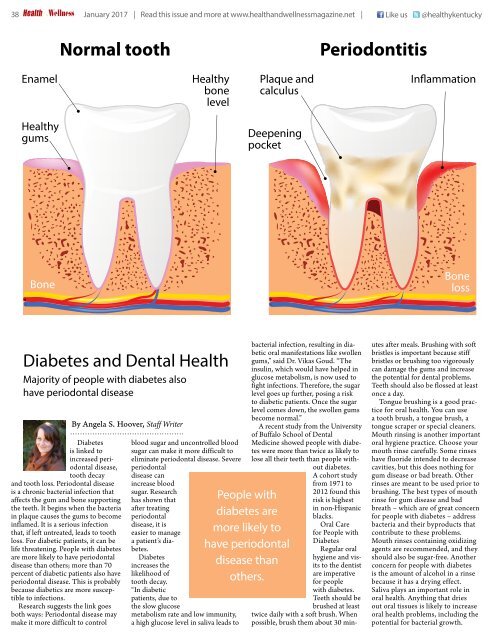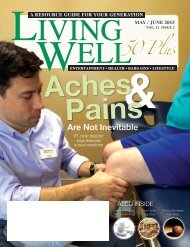You also want an ePaper? Increase the reach of your titles
YUMPU automatically turns print PDFs into web optimized ePapers that Google loves.
38 & <strong>Jan</strong>uary 20<strong>17</strong> | Read this issue and more at www.healthandwellnessmagazine.net | Like us @healthykentucky<br />
Diabetes and Dental <strong>Health</strong><br />
Majority of people with diabetes also<br />
have periodontal disease<br />
Diabetes<br />
is linked to<br />
increased periodontal<br />
disease,<br />
tooth decay<br />
and tooth loss. Periodontal disease<br />
is a chronic bacterial infection that<br />
affects the gum and bone supporting<br />
the teeth. It begins when the bacteria<br />
in plaque causes the gums to become<br />
inflamed. It is a serious infection<br />
that, if left untreated, leads to tooth<br />
loss. For diabetic patients, it can be<br />
life threatening. People with diabetes<br />
are more likely to have periodontal<br />
disease than others; more than 70<br />
percent of diabetic patients also have<br />
periodontal disease. This is probably<br />
because diabetics are more susceptible<br />
to infections.<br />
Research suggests the link goes<br />
both ways: Periodontal disease may<br />
make it more difficult to control<br />
By Angela S. Hoover, Staff Writer<br />
blood sugar and uncontrolled blood<br />
sugar can make it more difficult to<br />
eliminate periodontal disease. Severe<br />
periodontal<br />
disease can<br />
increase blood<br />
sugar. Research<br />
has shown that<br />
after treating<br />
periodontal<br />
disease, it is<br />
easier to manage<br />
a patient’s diabetes.<br />
Diabetes<br />
increases the<br />
likelihood of<br />
tooth decay.<br />
“In diabetic<br />
patients, due to<br />
the slow glucose<br />
metabolism rate and low immunity,<br />
a high glucose level in saliva leads to<br />
People with<br />
diabetes are<br />
more likely to<br />
have periodontal<br />
disease than<br />
others.<br />
bacterial infection, resulting in diabetic<br />
oral manifestations like swollen<br />
gums,” said Dr. Vikas Goud. “The<br />
insulin, which would have helped in<br />
glucose metabolism, is now used to<br />
fight infections. Therefore, the sugar<br />
level goes up further, posing a risk<br />
to diabetic patients. Once the sugar<br />
level comes down, the swollen gums<br />
become normal.”<br />
A recent study from the University<br />
of Buffalo School of Dental<br />
Medicine showed people with diabetes<br />
were more than twice as likely to<br />
lose all their teeth than people without<br />
diabetes.<br />
A cohort study<br />
from 1971 to<br />
2012 found this<br />
risk is highest<br />
in non-Hispanic<br />
blacks.<br />
Oral Care<br />
for People with<br />
Diabetes<br />
Regular oral<br />
hygiene and visits<br />
to the dentist<br />
are imperative<br />
for people<br />
with diabetes.<br />
Teeth should be<br />
brushed at least<br />
twice daily with a soft brush. When<br />
possible, brush them about 30 minutes<br />
after meals. Brushing with soft<br />
bristles is important because stiff<br />
bristles or brushing too vigorously<br />
can damage the gums and increase<br />
the potential for dental problems.<br />
Teeth should also be flossed at least<br />
once a day.<br />
Tongue brushing is a good practice<br />
for oral health. You can use<br />
a tooth brush, a tongue brush, a<br />
tongue scraper or special cleaners.<br />
Mouth rinsing is another important<br />
oral hygiene practice. Choose your<br />
mouth rinse carefully. Some rinses<br />
have fluoride intended to decrease<br />
cavities, but this does nothing for<br />
gum disease or bad breath. Other<br />
rinses are meant to be used prior to<br />
brushing. The best types of mouth<br />
rinse for gum disease and bad<br />
breath – which are of great concern<br />
for people with diabetes – address<br />
bacteria and their byproducts that<br />
contribute to these problems.<br />
Mouth rinses containing oxidizing<br />
agents are recommended, and they<br />
should also be sugar-free. Another<br />
concern for people with diabetes<br />
is the amount of alcohol in a rinse<br />
because it has a drying effect.<br />
Saliva plays an important role in<br />
oral health. Anything that dries<br />
out oral tissues is likely to increase<br />
oral health problems, including the<br />
potential for bacterial growth.
















